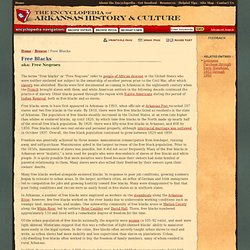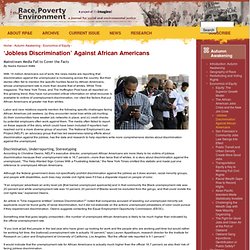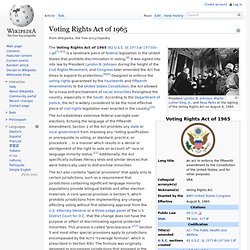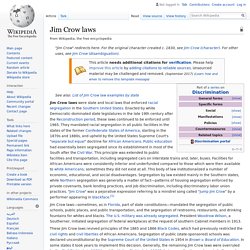

Freedom. The terms “Free blacks” or “Free Negroes” refer to people of African descent in the United States who were neither enslaved nor subject to the ownership of another person prior to the Civil War, after which slavery was abolished.

Blacks were first documented as coming to Arkansas in the eighteenth century when the French brought slaves with them, and white American settlers in the following decade continued the practice of slavery. Other blacks passed through the region with Native Americans during the period of Indian Removal, both as free blacks and as slaves. Free blacks seem to have first appeared in Arkansas in 1803, when officials at Arkansas Post recorded 107 slaves and two free blacks in the state. By 1810, there were five free blacks listed as residents in the state of Arkansas. Freedom was generally achieved by three means: manumission (emancipation from bondage), running away, and self-purchase.
Jobs. Mainstream Media Fail to Cover the FactsBy Nadra Kareem Nittle With 14 million Americans out of work, the news media are reporting that discrimination against the unemployed is increasing across the country.

But their stories often fail to mention the specific hurdles faced by African Americans, whose unemployment rate is more than double that of whites. While Time magazine, The New York Times, and The Huffington Post have all reported on this growing trend, they have not provided critical information on what recourse is available to victims of unemployment discrimination, nor cited the factors that put African Americans at greater risk than whites. Labor and race relations experts mention the following specific challenges facing African American job seekers: (a) they encounter racial bias while job-hunting; (b) their communities have weaker job networks in place; and (c) credit checks by potential employers often work against them.
References. Racism, still a factor. Slavery in the United States began soon after English colonists first settled Virginia and lasted until the passage of the Thirteenth Amendment to the U.S.

Constitution in 1865. The 19th century saw a hardening of institutionalized racism and legal discrimination against citizens of African descent in the United States. Although technically able to vote, poll taxes, acts of terror (often perpetuated by groups like the KKK) and discriminatory laws kept African Americans disenfranchised, particularly in the South. During this time, segregation, racial discrimination and expressions of white supremacy all increased, as did anti-black violence such as lynching and race riots.
Mouvements. Slavery. Voting Rights. The Act establishes extensive federal oversight over elections.

Echoing the language of the Fifteenth Amendment, Section 2 of the Act prohibits any state or local government from imposing any "voting qualification or prerequisite to voting, or standard, practice, or procedure ... in a manner which results in a denial or abridgement of the right to vote on account of" race or language minority status.[11] Additionally, the Act specifically outlaws literacy tests and similar devices that were historically used to disfranchise minorities. The Act also contains "special provisions" that apply only to certain jurisdictions, such as a requirement that jurisdictions containing significant language minority populations provide bilingual ballots and other election materials. A core special provision is Section 5, which prohibits jurisdictions from implementing any change affecting voting without first obtaining approval from the U.S.
Artwork Making An Impact. Education. St.

Paul's Chapel School, Brunswick County Julius Rosenwald, an early partner in Sears, Roebuck & Company, and later its president, met with Booker T. Washington in May 1911 and then established a fund to improve the education of southern blacks by building schools. Jim Crow Laws. Jim Crow laws—sometimes, as in Florida, part of state constitutions—mandated the segregation of public schools, public places, and public transportation, and the segregation of restrooms, restaurants, and drinking fountains for whites and blacks.

The U.S. military was already segregated. President Woodrow Wilson, a Southerner, initiated segregation of federal workplaces at the request of southern Cabinet members in 1913. Etymology The phrase "Jim Crow Law" can be found as early as 1892 in the title of a New York Times article about Louisiana requiring segregated railroad cars.[2][3] The origin of the phrase "Jim Crow" has often been attributed to "Jump Jim Crow", a song-and-dance caricature of blacks performed by white actor Thomas D. Rice in blackface, which first surfaced in 1832 and was used to satirize Andrew Jackson's populist policies. Origins of Jim Crow laws Cover of an early edition of "Jump Jim Crow" sheet music (circa 1832)
Farming.